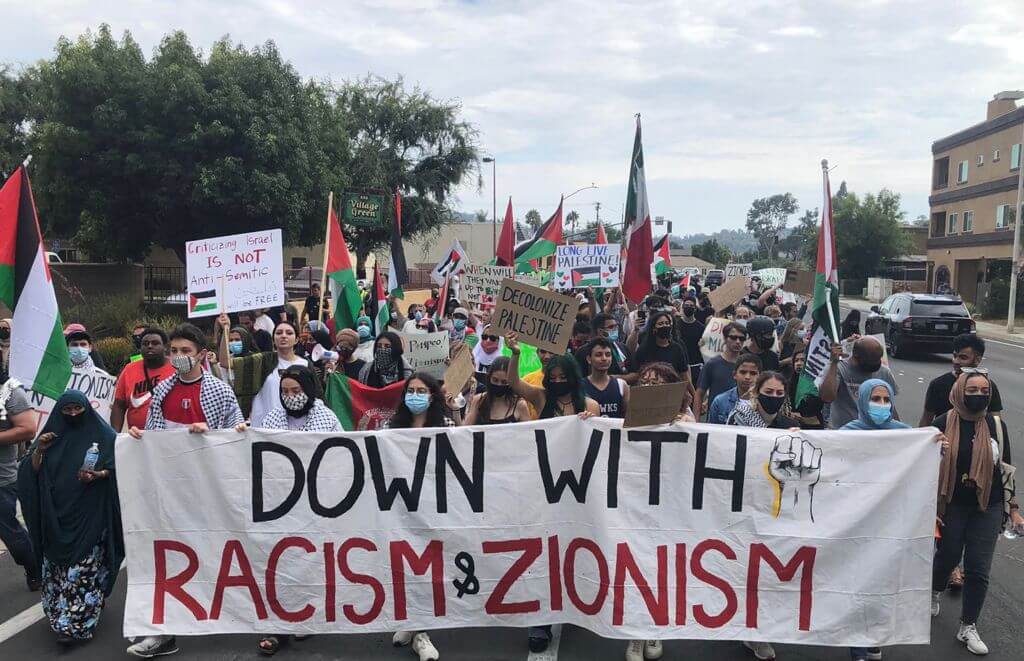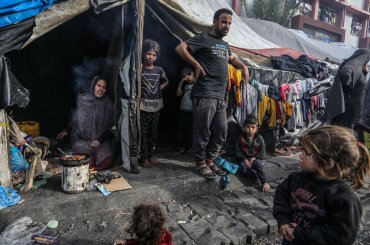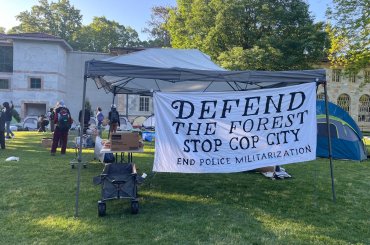The Palestine solidarity movement is entering a critical phase, as liberal Zionists and institutions desperately try to distance themselves from the new Israeli government. These groups may attempt to whitewash their records by throwing a few crumbs to solidarity actions and campaigns they previously refused to support. We will even see some Western governments ramp up (but ever so slightly) their rhetoric on Palestinian rights and the illusionary two-state solution. Although everyone would be happy to see a genuine change in attitude from such quarters, it is necessary to be vigilant as to the limits and motives of such support.
A look back at what happened in 1982/3 with Ariel Sharon is enlightening. The Israeli general was temporarily vilified for his role in the horrific Sabra/Shatila massacre, both in Israel and in the Western media, and one might have been convinced that there was finally a new international understanding regarding the Palestinian situation that would demand accountability for Israeli war crimes. Although there were some shifts in the political landscape, history is clear on what eventually transpired: Israel went on to continue its settler-colonialist agenda, Palestinian rights were further eroded, and Sharon himself was rehabilitated and even became Prime Minister in 2001.
It is also apparent that the anti-government demonstrations happening right now in Israel are not pro-Palestinian or even pro-democracy; Palestinian flags are being ripped down not just by police, but also by other protestors. A recent article by Yara Hawari touches on the many contradictions inherent in the current situation. Whether such contradictions will eventually produce any benefits for the Palestinian struggle remains to be seen, but if they do, it will not be because of pressure from the demonstrators currently in the streets.
The diaspora solidarity movement must grab this historical moment to push for real change regarding Palestinian rights, and not succumb to the temptation of temporary and superficial quick rewards.
Here in Canada, successive governments have long been some of the most ardent supporters of Israel. Recently, there have been some “whiffs” of a slight change in the Canadian position. On January 16, Foreign Affairs Canada issued a statement stating that: “Canada is a steadfast supporter of the International Court of Justice as the principal judicial organ of the United Nations, and it recognizes the important role the court plays in the peaceful settlement of disputes. We are deeply concerned by the punitive measures taken against the Palestinian Authority, which were recently announced by the Government of Israel, as well as the impact of those measures on the region’s stability and the prospect for a two-state solution.”
They did this, even though they did not sign a stronger statement endorsed by over 90 countries at the UN General Assembly; Canada is also on record as one of the leading voices against taking Israel to the ICC.
Activists in western countries must deal with the new reality of what’s happening on the ground in Palestine, as well as determine how to respond to these weak statements of “support” coming from groups and institutions that are not, and will not be, genuinely concerned about Palestinian national and human rights. There is a growing dissatisfaction, especially among younger Palestinians, with the lack of international accountability for Israel. They are increasingly placing less emphasis on appealing to the world’s conscience (or lack thereof), and instead working to support and amplify all means of Palestinian resistance to Israeli brutality and colonization. As that trend continues, small shifts in Western opinion become more and more irrelevant.
As activists, our voices and hard-fought campaigns should not be co-opted by anyone looking for temporary credibility vis-à-vis the new overtly fascist Israeli government. Four decades after the lessons of 1982, and the complete failure of the treacherous Oslo process, it is clear that coexistence with liberal Zionist agendas can no longer be an option. Now is the time to stand against Zionism clearly and publicly, both as an ideology and as a continuing settler-colonial project. Anything less is a betrayal of Palestine and its people.



It goes beyond just needing to be anti-Zionist, ie beyond finding any hope in a racist settler-colonialist society. But like Israel, the WB and Gaza are also run by repressive capitalist classes and there is great internal inequality -Israel, Palestine and the US have similar indices of inequality. A call even for a single secular state is inadequate if the same elites, the same capitalist system remains in power. The working classes – including students, professionals, farmers too – must unite in an anti-racist, anti-nationalist struggle for a worker run non-capitalist state. (I can’t get into a long discussion here about the failure of previous communist revolutions to achieve their goals, but we must strive to understand their errors and do much better.) This goal would unite us in the present in struggle – uniting Jews, Palestinians and international allies in opposing local fascism, nationalism and world capitalism/imperialism which is leading to disaster on many fronts. You are welcome to read multiracialunity.org for comments on many aspects of these issues.
The Palestine solidarity movement is entering a critical phase, as liberal Zionists and institutions desperately try to distance themselves from the new Israeli government…. it is clear that coexistence with liberal Zionist agendas can no longer be an option.
____________________________________________________________
This assumption about coexisting with liberal Zionist deserve reexamination. There is a strong case for bridging with those now challenging the ongoing racist, settler-colonialism. They are a competent lot.
Also, it’s imperative to reach a consensus on having one state with equal civil and political rights vs having a separate state. Deciding where to head is a step to getting there.
Some ways to achieve independence are contradictory to those for achieving a secular, pluralistic state. There is the question whether rocks or car rammings are likely to lead to ending apartheid, brutality or humiliation or whether they make doing so more problematic.